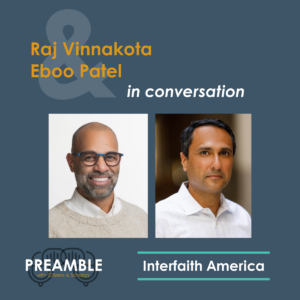Preamble: Baratunde Thurston
August 5, 2024
Share
In this urgent moment for our nation, we can strengthen democracy—together. Raj Vinnakota, President of the Institute for Citizens & Scholars, sits down with diverse leaders to learn about their work and hear their ideas for shaping a more perfect Union. Here, Raj talks with Baratunde Thurston, Emmy-nominated host, producer, writer, and public speaker.
Below are edited excerpts from the conversation recorded on July 16, 2024.
Why the practice of democracy goes beyond transactions
Raj Vinnakota: What was the catalyst or an incentive to start How to Citizen?
Baratunde Thurston: The inspiration for How To Citizen more directly came out of the frustration with news and the story that we tell ourselves about ourselves – what we’re capable of and who we are. We have this fun house mirror version of ourselves where we are lazy, we’re unengaged, we’re totally divided, and we are, in part, all those things. We all contain all of that, but we contain a lot more. And I had been seeing a different story play out of people who were taking an active role in shaping their communities and just wanted to tell that story. There’s another deeper inspiration, which is that many of us hadn’t been invited in to participate.
I think that comes back to this election moment where there are very excited people on both sides in deep corners. There are a lot of folks settling closer to the middle, but we’re asked to do very little in the face of extraordinary challenges and extraordinary opportunities. We’re asked to shop, we’re asked to vote, and those are both pretty transactional the way we experience them. Folks come around every cycle. There’s a sales cycle for both of them. There’s marketing pitches. There’s commercials and advertising sales and marketing divisions. And the practice of democracy is that it’s a practice. It’s a practice of how we live together and living encompasses so much more than financial and electoral transactions. And so what can we do – whether we have documentation or not – to citizen, is to reclaim that language and reclaim the story of who we are by inviting multiple levels of participation to establish what democracy really is, which is a set of acts, not a possession.
“If we take “citizen” as a verb and not a noun, we’ve found some principles along the way. I think those have withstood a lot of testing for elements. It means showing up…a bias toward participation and action. It means understanding power, being fluent in the language of power, not fearful of it, and understanding it’s not zero-sum. It means committing to the collective, not just individual self, that we see ourselves as part of something greater than just ourselves and our families.”

Baratunde believes our cultural soil needs tending
Raj Vinnakota: Has your hypothesis on what it means to be a citizen born true as you’re having these conversations on the podcast? Are you getting affirmation or has that tweaked over time in certain ways?
Baratunde Thurston: I have a bias toward, to quote Elizabeth Warren, “big structural change.” This journey has really brought me into respect for small, respect for interpersonal, and inter-relational, as a necessary component of big structural change. And there’s a sort of nature metaphor here that wasn’t where we started, but that our experience of democracy is born of a culture. That culture can be seen as soil, and we must maintain the health of that soil and physical cell. We can regenerate it, we can compost, we can add nutrients to it in a good way, not in a transactional hyper geo mode, false additives, poisonous way, which works in the short term. But in the long term, the experience we have grows out of that soil. And so a lot of us are frustrated with the tops of the trees.
I don’t like that institution. I don’t like that decision. I don’t like the tenor of that candidate, but those treetops started in the earth in root systems, and we affect that culture and that system. So yes, we need some campaign finance reforms and some criminal justice reforms and some, in my view, some Supreme Court reforms, maybe even some constitutional reforms along the way. And maybe how we get to those is in the root system. It’s how we’re practicing in our homes, in our schools, in our businesses, on our Zooms. We allow or disallow certain behavior. We incentivize or disincentivize certain behavior. And if we are really shocked by what we’re seeing as a result of this system, we’re not being honest about how we’ve contributed to that system. Or fail to. So it’s a real balancing act. It’s not a total woo-woo manifestation thing. It’s not a bootstraps personal responsibility thing, but it is a shared ownership of the system that we’re in. That gives us a bit more agency and power to change it if we reorient to the story of it.
On how to resist divisiveness
Raj Vinnakota: The terms I use are that we need to change practices, habits, and norms. In the end, it’s about changing human beings and that takes time. It’s not the treetops, it’s kind of in the soil.
Baratunde Thurston: A lot of the things that we despise in our current system, we carry some of that within us. There’s a tiny despot in me who’s got teeny tiny authoritarian tendencies. You haven’t seen me drive. And so sometimes I will express a level of outrage, disgust, surprise at some behavior and dismiss anyone associated with it as idiotic, unintelligent, totally disconnected, inhuman even. When I’m really honest, I’m like, okay, I get the attraction. Do I succumb to that temptation? That’s a different question. But to acknowledge the rationality of the temptation is a really big step because once we start the path of, well, they’re nothing like us, that can be a very slippery slope to dehumanization, which sets a different kind of culture and a stage for political violence, which we have seen ratcheting up. Not evenly by any stretch, but absolutely ratcheting up. I want to tend to that part of me that feels those urges. I think part of our challenge too is we don’t have healthy outlets for this stuff. And so it comes out sideways.
On combatting young people’s disillusionment with democracy
Raj Vinnakota: I feel like we’re in a moment right now where especially the youngest Americans are looking at the choices they have in front of them with the upcoming election and getting really close to saying, “I’m out.” I spend a lot of time thinking about what “I’m out” looks like if our youngest generation says, “I’m not sure democracy is working for me.” How are you thinking about this?
Baratunde Thurston: No individual controls very much of the whole world, but together we control a lot. And if you are someone who is frustrated by these electoral choices, that is a very sane response. We’ve got over 300 million people. I’ve met a good number of them. There are very qualified folks who I look forward to being upset with as president, right? I look forward to being disappointed in them, knowing that they’re trying, knowing that they’re surrounding themselves as good people, knowing that they see it as a service and are not overstaying their welcome in service. The outcome of this system leaves a lot to be desired. It could be better. And so I just want to acknowledge I’m frustrated. I’m not stoked about these choices. I’m also operating within the realm of them, and I’m going to make my choices within that system and I’m going to continue to try to envision, imagine, and help propel us toward a system that is better and doesn’t leave us feeling uninspired or underserved or overlooked.
The power of doing and discomfort
Raj Vinnakota: A lot of the work we’re doing here at Citizens & Scholars is around civil discourse and constructive dialogue. How do you see that playing a role in all of these efforts?
Baratunde Thurston: Priya Parker was on our podcast, The Art of Gathering author and practitioner, and she said something that has stuck with me: sometimes the talking is not the thing we need to do. I had some access to this other way with my PBS show America Outdoors. To have experiences with each other, that are not about the difficulty of being with each other, is one way that I have found starts to heal some of this.
Many states are outlawing literal words, lesson plans, books, and curricula under the premise that they make white students feel uncomfortable. First of all, all of high school was uncomfortable, right? That is a feature, not a bug. If we think our children are so fragile as to not be able to handle true discomfort, we are setting them and all of us up for a non-resilient society that will fail, that will collapse. So let’s have faith in ourselves and in our kids to be able to deal with difficulty and recover from it. But the suppression and fear and aversion to discomfort, I have to name that. It’s not just Kumbaya hikes together. We need practice at facing things that make us feel bad without letting that metastasize into behaving badly as a result.
“We need to do things together, not just discuss things. So if the problem is a discourse, discourse about discourse may not be the solution.”

A history lesson that may surprise you
Raj Vinnakota: How do you continue to grow your civic knowledge?
Baratunde Thurston: I stay open to new information. A practical and present example is the story of the founding of this country, which until quite recently – and I’m very proud of my general knowledge – I did not understand the depths of this. The Founding Fathers, as we refer to them, were heavily guided, mentored, and even cajoled by the Indigenous people who were already here into practicing democracy because the Haudenosaunee Confederacy that existed here was already living it. And many of our symbols, our language, our professed values are direct copies and pastes of a preexisting system. The idea that democracy is native to this land and to the people closest to it makes it all the more beautiful and an inheritance that we have to steward. It increases the need for us to be in the right relationship with those people. Our nation of laws has violated every treaty with the several nations that have already been here. We cannot move forward healthily in a good way without correcting that. I just think that’s a beautiful invitation and opportunity for us all.
Why Baratunde is optimistic about our democracy
Raj Vinnakota: Are you optimistic about our democracy? Why or why not?
Baratunde Thurston: I am optimistic about the democracy we have yet to create because I see indications that something beautiful and new is being born, even as we’re letting go of something painful that’s clearly not working for a lot of people.
“What made it American democracy were the original Americans, the people who welcomed the settlers with corn and a practice of democracy. So for us to be willing to claim that, to be originalists in a historical sense…I mean, that’s the original originalism from the original peoples. That gives me hope, even as we are guaranteed really tough times.”

Stay Engaged
Get More News
Join our mailing list to get more news like this to your mailbox.
Support Our Work
Help us invest in the talent, ideas, and networks that will develop young people as effective, lifelong citizens.
Ways to Support Us